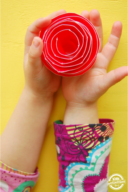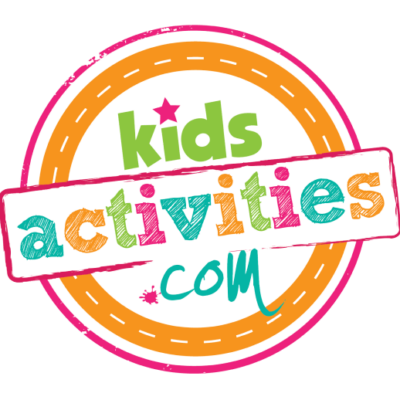Have you ever wondered
how to teach your preschooler to read? Creating a strong foundation for
reading in preschool years is vital for a child’s future success.
Studies show that children need writing to help them learn to read, they need reading to help them learn to write, and they need oral language skills to help them learn about both.
That circle just makes my head spin!
And you know what? The responsibility of providing a firm foundation in early literacy sits squarely on the shoulders of their caregivers.
That means us, moms!

Creating a Foundation for Reading in Preschool
But what the heck is early literacy?
“Early literacy” is the term used for early reading and
writing skills in preschool.
As a mom, that means that everything I do — from writing my son’s name on his paper to pointing out the words on the signs in the grocery store to playing with letter magnets on the fridge — helps to build his foundation for reading.
These early childhood skills help kids become active learners who are able to successfully navigate written and oral language.
So, how do you create that strong foundation for reading in your kids? It all starts with introducing them to the world around them.
Some affiliate links below.
How to Develop Early Reading Skills in Preschool
Exposure to Books
It’s never too early to start reading to your child. Even if your baby is still in his bouncy seat or your toddler is playing with his toys and barely seems to be listening, you can still break out a book and read to him.
Infants and toddlers can benefit greatly from hearing new vocabulary and listening to vocal expressions! I can’t even begin to tell you how many times I read, “Going on a Bear Hunt,” to my boys when they were little, because it has such fun opportunities to vary your voice as you read.
But reading aloud without interaction is not enough to build a strong, solid foundation. Engaging preschoolers while you read read and asking questions helps them connect vocabulary to the world around them. Some questions could be, “Have you ever been on an airplane like the character?” or “What do oranges taste like to you?”
Questions that encourage the development of critical thinking are also vital to
developing a strong reader. You can ask, “What do you think will happen next?” or “How do you think the character felt?”
Studies show that children make significantly more gains when read to and asked questions versus when they are passive listeners. That means that we have to expose our kids to a wide variety of reading material and engage them through thoughtful, interactive questions. Ask them what they think about the book and share in their excitement about what’s coming next.

Integrate Technology
Technology has given us parents a new avenue for supporting our children’s early literacy development.
One of our favorites is
ABCmouse, an online reading program that gives kids as young as two a chance to practice letter recognition, basic phonics, and other skills.
My boys loved, loved,
loved “playing” on that site, and I loved that they were really learning. For them, it was like a video game but I knew they were getting
so much more out of it!

From handheld devices with
educational apps to desktop computers that provide
interactive learning, using technology is key to a building a young child’s foundation in reading.
Don’t have a laptop or tablet? It’s okay! You can even download apps to your phone for them to use.

Learning Games and Activities
Learning games enhance play by focusing kids’ attention on specific skills.
Alphabet activities are the perfect introduction to letters for little ones and offer a hands-on, tactile approach. Creative
worksheets are a fun way to help kids learn.
They can explore phonics and letters with crafts (break out the glitter and glue!), and
engage a variety of senses to create a learning experience that lets them see, hear, smell, touch, and possibly even taste the world around them.
Kids can learn to read the temperature with this
printable and practice craft!
So, start playing with your children more, reading constantly, and asking questions that will help them understand how the world around them is connected to the written word. You have the power to create a strong foundation for reading in preschool when you begin to see early literacy in new ways.
You can do it! And, we have your back. Happy learning!
If you’ve ever thought about trying ABCmouse.com to help your kids learn, NOW is the time! They’ve offered Kids Activities Blog readers a risk-free, 30-day special that can’t be beat. It’s worked SO well for our family and we hope it works for you too! CLICK HERE to try it NOW!


 From handheld devices with educational apps to desktop computers that provide interactive learning, using technology is key to a building a young child’s foundation in reading.
Don’t have a laptop or tablet? It’s okay! You can even download apps to your phone for them to use.
From handheld devices with educational apps to desktop computers that provide interactive learning, using technology is key to a building a young child’s foundation in reading.
Don’t have a laptop or tablet? It’s okay! You can even download apps to your phone for them to use.






















Yes! Yes! Everything we do at home can be a learning opportunity- I like your example about writing your son’s name. I especially love your point at the end about playing with our children. Interacting and engaging with our children while they are learning can help cultivate positive associations with reading and learning that can last a lifetime!
This is an excellent suggestion “That means that we have to expose our kids to a wide variety of reading material and engage them through thoughtful, interactive questions. Ask them what they think about the book and share in their excitement about what’s coming next.” By involving the children more during reading time you increase their abilities to understand the text before even recognizing words.
I just finished a post on book related pretend play that helps to encourage literacy in young children. You can read it here if interested https://www.growingplay.com/2017/08/pretend-play-literacy/